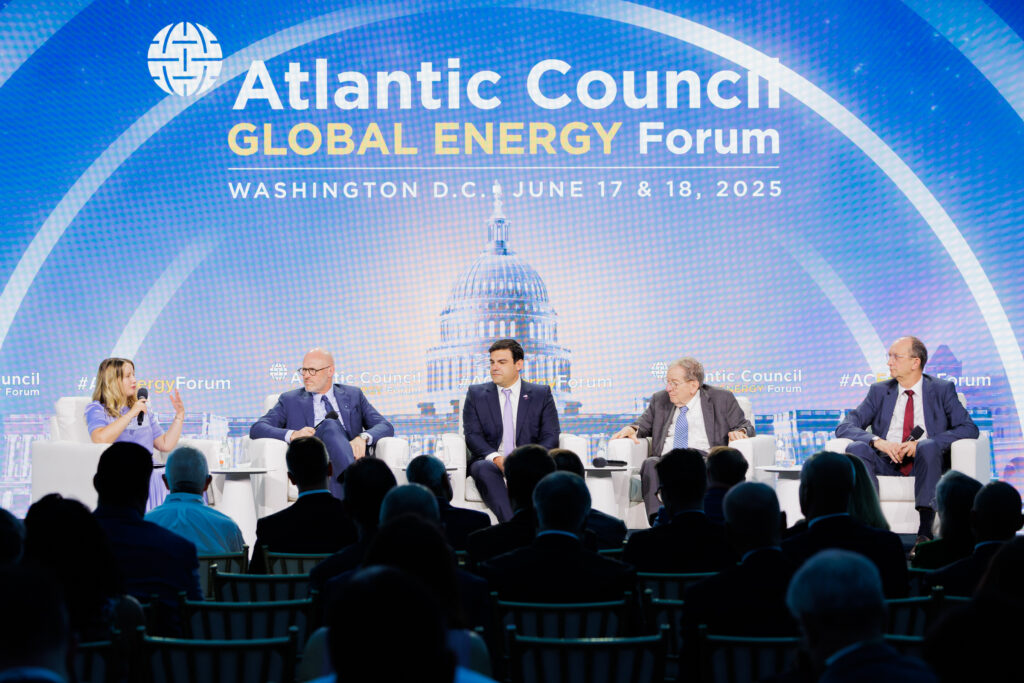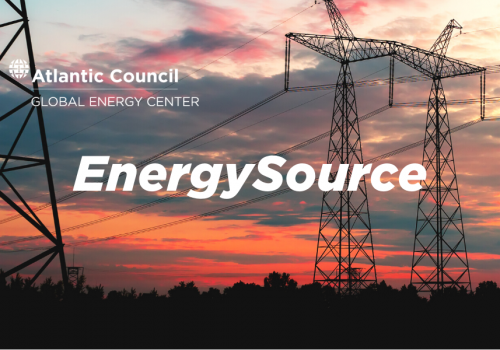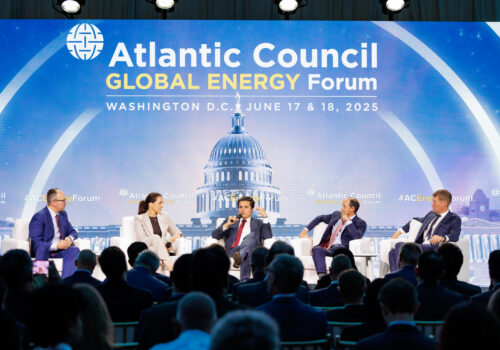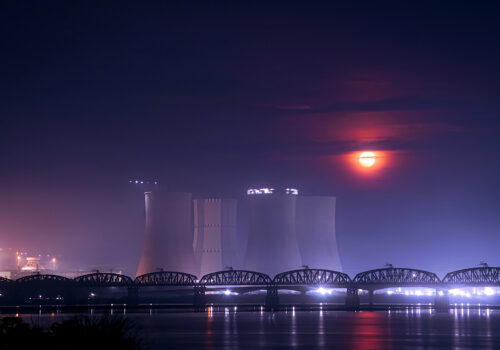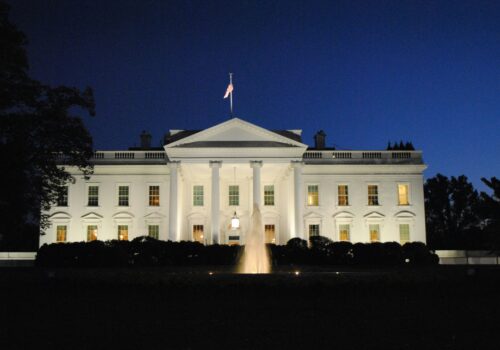The Atlantic Council’s flagship Global Energy Forum concluded its programming in Washington, DC, today. What emerged as a central theme throughout was the undeniable need for any single country to engage in international partnerships to achieve energy and national security, whether speakers were discussing divergent transatlantic views, nuclear power, or critical mineral supply chains.
What transatlantic energy cooperation looks like under America First
The panel “Partnership for prosperity: Can the US and Europe both win in the America First era?” addressed the evolving landscape of transatlantic relations, focusing on both the challenges and opportunities that lie ahead. The discussion was moderated by Olga Khakova, deputy director for European energy security at the Global Energy Center (GEC), panelists included Amb. Richard Morningstar, founding chairman of the GEC and former US ambassador to the European Union (EU), Torgrim Reitan, chief financial officer of Equinor, Toby Rice, president and chief executive officer (CEO) of EQT, and Klaus Wiener, member of the German Bundestag.
A central theme throughout the conversation was the enduring connection and shared values between the EU and the United States, grounded in a long-standing alliance. Wiener affirmed “we are very strong allies,” while Reitan added, “we belong together.” These comments underscored the historical and strategic ties between the United States and Europe.
While acknowledging the relationship’s current difficulties, all panelists agreed on the need to find common ground and foster a forward-looking agenda rooted in mutual interests. The panelists raised liquefied natural gas (LNG) as a focal point of transatlantic cooperation. “Europe needs security and flexibility and US LNG can provide for that,” said Rice, highlighting LNG as a central issue in US-EU negotiations.
Morningstar emphasized that other energy technologies, including nuclear and fusion, should also be considered. He noted that the development and deployment of these technologies will depend not only on political will but also on private sector engagement. When asked about the future, Reitan responded, “we need to build predictability and overcome barriers.”
Nuclear energy has global momentum. What’s next?
Jennifer T. Gordon, director of the GEC’s Nuclear Energy Policy Initiative, moderated “The role of nuclear energy in global energy security,” a discussion featuring Sama Bilbao y León, director general of the World Nuclear Association, Aleshia Duncan, deputy assistant secretary for international cooperation at the US Department of Energy’s Office of Nuclear Energy, Amb. Georgette Mosbacher, co-chair for Three Seas programming at the Atlantic Council Europe Center and former US ambassador to Poland, Jeremy Pocklington CB, permanent secretary at the United Kingdom’s Department of Energy Security and Net Zero, and Robert Rudich, chief business development officer of Synthos Green Energy.
Gordon began by highlighting that the conversation takes place at an exciting time for nuclear both globally and in the United States, where four recent nuclear power-focused executive orders demonstrate “an ambitious agenda for civil nuclear partnerships.” Duncan detailed US government efforts to ensure those partnerships succeed. Nuclear power is “a 100-year relationship,” Duncan said, noting the pitfalls inherent with such timescales.
Bilbao y León provided a global tour of the nuclear sector’s momentum, citing reversals of opposition to nuclear power in European states and at the World Bank, a long list of projects underway across the Global South, and efforts to lead in the technology by both the United States and China. Bilbao y León lauded the progress of a 31-nation “coalition of the ambitious,” which is mobilizing to realize the COP28 objective of tripling global nuclear capacity by 2050.
Pocklington focused on the United Kingdom, which is building new conventional and advanced reactor capacity in addition to prolonging and maximizing existing nuclear power generation. “The single greatest challenge,” he said, “is figuring out what we can do to speed up the process,” citing financial innovations that the country is pioneering to make projects a reality.
The next two panelists discussed US nuclear partnerships in Poland and Central Europe. Mosbacher praised Poland’s foresight in reducing its reliance on Russian gas even before the full-scale invasion of Ukraine. Today, she argued, US policymakers must exercise similar foresight in fostering partnerships to keep pace with nuclear-exporting adversaries in Russia and China: “if we don’t scale up fast, we will be left behind.” Rudich offered a private sector perspective, elaborating on Polish firm Synthos Green Energy’s efforts with North American partners to build advanced reactors that will eventually “go beyond Poland and construct the Green Wall.” This zone, stretching from the Baltic states to the Black Sea, would use nuclear power to eliminate dependency on Russian energy. Helping to enact this ambitious plan, Rudich argued, is profoundly in the US national interest: “energy dominance,” he said, “means exports.”
Gordon concluded the conversation by asking what participants would like to see changed in nuclear energy before the 2026 Global Energy Forum. As stakeholders increasingly realize “energy security is national security,” Duncan suggested, “we should fund it as such.” Duncan and Bilbao y León both emphasized the importance of leadership for the deployment of reactors at scale. Rudich concluded by stressing the need for funding to translate into action: “we need to start doing projects and move away from talking about doing projects.”
Can quick wins in critical minerals reduce reliance on China?
The final panel of the Global Energy Forum, “Critical minerals, critical decisions: Quick wins in critical mineral supply chain partnerships,” was moderated by Audrey Hruby, Atlantic Council Africa Center senior advisor, and featured Helaina Matza, chief strategic development officer of TechMet, Stephen Rowland, head of North America copper at Glencore, Reggie Singh, director of the US Department of State Bureau of Energy Resources’ Critical Minerals and Energy Technology Office, and Imad Toumi, chairman and CEO of Managem.
Hruby began by elucidating the central goal of the conversation: “in a long-term sector like mining, we want to look for quick wins.” The fundamental challenge? “We rely too much on one major player for all our critical minerals: China,” continued Singh, who elaborated on how the US government is working to initiate international partnerships that diversify supply while meeting rapidly rising minerals demand.
Matza, delivering a financial sector view of government initiatives, commended bipartisan efforts to “operate a little more like US Government, Inc.,” and make use of unique capabilities among partners to bring more supplies to market. Toumi, who runs a Moroccan minerals company, shared an African perspective: “we no longer want to export raw materials; we need to refine.” He provided an overview of his company’s efforts to work with African partners to build holistic supply chains able to compete with China.
Rowland zeroed in one key mineral—copper—which is faced with spiking demand from electrification and data centers. Despite this challenge, Rowland suggested resource availability is not the issue: “it’s hard to say if the bottleneck is copper or power,” pointing out the inadequate scale of extraction.
Hruby concluded by posing a rapid-fire question to the panel: “what can we achieve in 24 months rather than five-to-ten years?” Participants responded with measures such as pushing forward shovel-ready projects, fostering innovation and recycling, and legislative changes in the United States and globally to fast-track development.
Equinor and EQT are sponsors of the Atlantic Council’s Global Energy Forum. Managem is a sponsor of the Atlantic Council’s Africa Center. More information on Forum sponsors can be found here.
Elena Benaim is a nonresident fellow with the Atlantic Council Global Energy Center.
Paddy Ryan is a former assistant director with the Atlantic Council Global Energy Center. He is a senior writer/editor at the University of California Institute on Global Conflict and Cooperation.
MEET THE AUTHOR
RELATED CONTENT
OUR WORK

The Global Energy Center develops and promotes pragmatic and nonpartisan policy solutions designed to advance global energy security, enhance economic opportunity, and accelerate pathways to net-zero emissions.
Image: Panelists on a stage discuss US-EU energy cooperation. (Atlantic Council)
